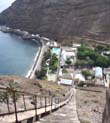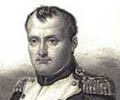| |
| |
EDITORIAL: NAPOLEON THE EUROPEAN
Naples and Benevento last week, Jena this summer - and of course the grand re-enactments planned there for this autumn -, Poland is actively preparing for the bicentenary of 1807, Dutch academics are studying the brief reign of Holland's first king, Louis Bonaparte, and even Spain has created a National Committee for the bicentenary of the Peninsular War... the whole of Europe is working on Napoleonic bicentenaries and talking about and studying Napoleonic subjects.
Did I say the whole of Europe?
Not quite.
For "one village in Gaul is still resisting"... It is true that the Grande Chancellerie de la Légion d'Honneur has been, and is, celebrating the two hundredth anniversary of its educational establishments: with a conference next week and a concert last week. The famous "Demoiselles" were there, as was the public. The Grand Chancelier addressed the assembly with a vibrant homage to the emperor. The concert was excellent. Only one person was missing, the Grand Master of the Order, in other words, the president of the Republic, who cried off at the last minute.
Napoleon nevertheless continues to become ever more a European figure, despite the fact that one country continues to behave as if they had nothing to do with him.
An excellent Napoleonic week to you.
Thierry Lentz

|
|
|
| |
THIS MONTH'S BOOK
Balades napoléoniennes dans Paris. Consulat et Premier Empire, Karine Huguenaud
Ever wondered what Paris was like during the First Empire, with its town mansions, its palaces? With this book, travel back in time, to wander the street of Napoleonic Paris, visit the Bonapartes on Rue Chantereine, or visit the First Consul in his palace in Saint-Cloud or the Emperor in his palace at the Tuileries. This guide, with its ten different itineraries, brings you a Paris which is no more.
© nouveau monde éditions

|
|
|
| |
THE CLEMENCEAU ON ST HELENA
Opponents of plans to build an airport on the island of St Helena have suggested that the French aircraft carrier Clemenceau should break its return journey to France, because they believ that the vessel could provide a suitable alternative...
Port of Jamestown
© Fondation Napoléon

|
|
|
| |
NAPOLEONIC PAGES
John Holland Rose's classic Napoleon, a life
This classic biography of Napoleon has stood the test of time because in many ways it upholds his bold claim at the end of the preface that "I can honestly say, in the words of the late Bishop of London, that "I have tried to write true history.""

|
|
|
| |
200 YEARS AGO
On 4 April, 1806, a decree was passed imposing an Imperial catechism for children in their religious instruction. This catechism (a series of questions and answers memorised by the child and repeated to the priest) was decreed as the only one to be used in the Empire.
Plans for a single general French catechism had been part of the Organic Articles to the Concordat of 1802. The request had been made by the dioceses in an attempt to regularise the system of multifarious catechisms left over from the Ancien Régime. For its part, the new regime wished to exercise control over the teachings of the church, thus linking civil and religious obedience, creating a unified morality. The new catechism, completed in 1803, was for the most part the work of the Abbé d'Astros, the nephew of Portalis. In addition to the usual religious questions, the Imperial Catechism imposed a special chapter where children recited that they had a Christian obligation to the Emperor. The fourth commandement was particularly important in this respect: «Honour your father and mother». References to the regime were clear. Taxes and military service became integral parts of Christian duty. On 30 March, 1806, the Papal Legate, Caprara, declared that the catechism «conformed to the doctrines of the Catholic Church». Thus supported by the Church (the clergy after all benefitted from the support of the regime in their attempts to re-establish themselves after the difficulties of the Revolution), Napoleon I decreed the adoption of the new catechism.
For the Napoleonic part of the Imperial Catechism on the web, click here.
Wishing you an excellent, Napoleonic, week.
Peter Hicks
Historian and Web editor
THE NAPOLEON.ORG BULLETIN, No 365, 31 March - 6 April, 2006
Interested in the work of the Fondation Napoléon? Why not participate, either generally or in a specific project, by making a donation.
© this Napoleon.org weekly bulletin is published by the Fondation Napoléon. Reproduction or all or part of this bulletin is forbidden, without prior agreement of the Fondation Napoléon.

|
|
|
|
|
|
|
|
|
|
THIS WEEK in the MAGAZINE
WHAT'S ON
Conferences
- The Paris Congress (1856), a founding moment, Paris, France
- In the embrace of France: The Law of Nations and Constitutional Law in the French Satellite States of the Revolutionary and Napoleonic Age (1795-1813), Tillburg, The Netherlands
Fairs
- The 13th International Napoleonic Fair, St Albans, UK
Exhibitions
- Treasures of the Fondation, Mexico 2006, Monterrey, Mexico
- Napoléon an intimate portrait, Tallahassee, Florida, USA
- "Battle in a sittingroom." The Austerlitz wallpaper, Museo Napoleonico, Rome, Italy
- "Beauty celebrating power": Vincenzo Monti in the Napoleonic period, Milan, Italy
- Louis Napoleon: at the court of the first King of Holland, 1806-1810, Apeldoorn, Netherlands
Entertainments
Thursdays at the Museum of Florida History, Tallahassee, Florida, USA
Got a problem with the letter? Try the home page: http://www.napoleon.org
<<
|
|



